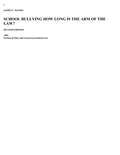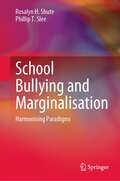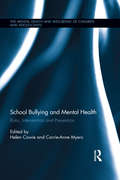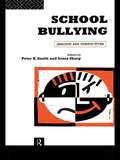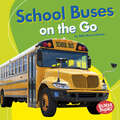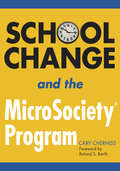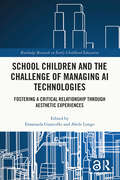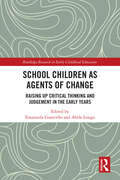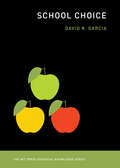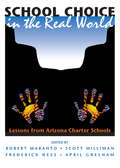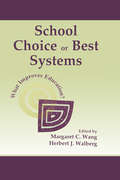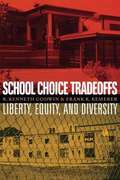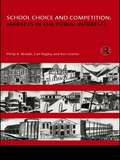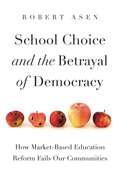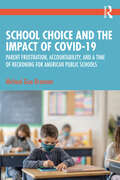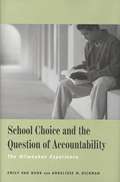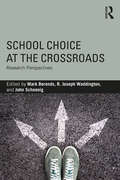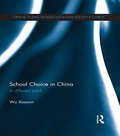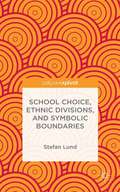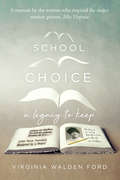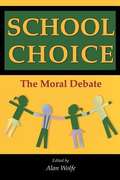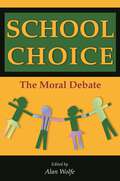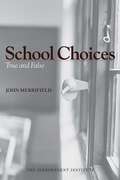- Table View
- List View
School Bullying
by James C. HanksAnti-bullying is a cause embraced at every level of society, from the grass roots to the federal government. Yet despite well-published efforts to tackle it, bullying persists. The consequences for students and for the educational community are always painful, and sometime tragic. The law has responded to the problem of bullying at the state and local level, through the adoption of statutes and state or local policies. <p><p>This guide reviews state statutes and case law concerning bullying, explores the constitutional issues that arise from the application of anti-bullying regulations, examines federal guidance on harassment, and offers suggestions for a systematic approach to bullying.
School Bullying and Marginalisation: Harmonising Paradigms
by Phillip T. Slee Rosalyn H. ShuteThis book addresses, and seeks to harmonise, different paradigms for understanding school bullying. It sets out to examine two paradigms for conceptualising bullying, and the worldviews that underpin them. It uses a complex systems perspective to bring the two paradigms together in a holistic fashion. By doing so, it creates an integrated framework for conceptualising the many individual, relational and societal factors that are in dynamic interaction and play a part in promoting or reducing school bullying. This book draws upon a number of disciplines by way of background, including evolutionary, child development and social psychological theories of group behaviour and identity. It proposes that the human need for belonging is central to understanding bullying, and situates the topic within an understanding of gender and children’s human rights, bringing philosophical and moral perspectives to bear. It discusses practical ways forward, presents a systemic approach to bullying and application of complex adaptive systems methods to bullying research and evaluation. It serves as an introduction to such methods and suggests further creative ideas for policy, intervention practice, and teacher education about bullying.
School Bullying and Mental Health: Risks, intervention and prevention (The Mental Health and Well-being of Children and Adolescents)
by Helen Cowie Carrie Anne MyersBullying amongst young people is a serious and pervasive problem, and recent rapid advances in electronic communication technologies have provided even more tools for bullies to exploit. School Bullying and Mental Health collates current research evidence and theoretical perspectives about school bullying in one comprehensive volume, identifying the nature and extent of bullying and cyberbullying at school, as well as its impact on children and young people’s emotional health and well-being. There are many negative consequences of bullying, and children and young people who have been victimised often suffer long-term psychological problems, such as increased levels of anxiety, depressive symptoms, social isolation, loneliness and suicidal ideation. Perpetrators of bullying also have a heightened risk of experiencing problems such as anxiety and depression, as well as eating disorders and antisocial behaviour. Founded on rigorous academic research, this important book tackles the negative consequences of bullying, and bullying culture itself, by examining the social and cultural contexts that perpetuate such behaviour from childhood through adolescence and potentially into adulthood. Containing contributions from an international team of authors, this book explores current interventions to prevent and reduce school bullying and to alleviate its negative effects on the mental health of children and young people. In-depth discussion of the profound implications of this research for researchers, practitioners and policymakers makes this book essential reading for those interested in bullying culture and the mental health and well-being of children and adolescents.
School Bullying in Different Cultures
by Peter K. Smith Smith, Peter K. and Kwak, Keumjoo and Toda, Yuichi Keumjoo Kwak Yuichi TodaSchool bullying is widely recognised as an international problem, but publications have focussed on the Western tradition of research. A long tradition of research in Japan and South Korea, and more recently in mainland China and Hong Kong, has had much less exposure. There are important and interesting differences in the nature of school bullying in Eastern and Western countries, as the first two parts of this book demonstrate. The third part examines possible reasons for these differences - methodological issues, school systems, societal values and linguistic issues. The final part looks at the implications for interventions to reduce school bullying and what we can learn from experiences in other countries. This is the first volume to bring together these perspectives on school bullying from a range of Eastern as well as Western countries.
School Bullying: Insights and Perspectives
by Peter Smith Peter K Smith Sonia SharpGives a succinct and authoritative account of research into the nature and extent of bullying in schools, evaluating the success of different approaches to the problem.
School Buses on the Go (Bumba Books ® -- Machines That Go Ser.)
by Beth Bence ReinkeCarefully leveled text and fresh, vibrant photos engage young readers in learning about how school buses work. Age-appropriate critical thinking questions and a photo glossary help build nonfiction learning skills.
School Change and the MicroSociety® Program
by Professor Cary ChernissBe an agent of positive, enduring change with these specific strategies gleaned from the MicroSociety® program and apply them to your school improvement efforts.
School Children and the Challenge of Managing AI Technologies: Fostering a Critical Relationship through Aesthetic Experiences (Routledge Research in Early Childhood Education)
by Abele Longo Emanuela GuarcelloThis edited volume recognises the need to cultivate a critical and acute understanding of AI technologies amongst primary and elementary school children, enabling them to meet the challenge of a human- and ethically oriented management of AI technologies.Focusing on school settings from both the national and international level to form comparative case studies, chapters present a robust conceptual and foundational framework within a global context as the idea of AI and our relationship to it advances apace. The book uses research garnered from interviews and observational data, qualitative and quantitative research, and theoretical findings gathered from single schools or institutions across the world. Providing an innovative perspective in promoting the importance of a critical, creative and ethical orientation based on aesthetic experiences, the book focuses on development in areas like visual arts, literature, environmental education, robotics, photography and screen education, movement and play.Ultimately, the book responds to an urgent and time-sensitive call to provide guidance on AI to primary education researchers and will be of interest to academics, scholars and researchers in the fields of primary and elementary education, technology in education, children's rights education, and moral and values education more broadly.
School Children as Agents of Change: Raising up Critical Thinking and Judgement in the Early Years (Routledge Research in Early Childhood Education)
by Abele Longo Emanuela GuarcelloThis edited volume promotes the capacity for critical thinking and judgement in primary school-aged children in the face of the challenges that schools encounter in today’s society. Foregrounding critical thinking and judgement as essential capacities for children to develop, each chapter offers a space for reflection on the formation of the ability to think and judge in primary school. While presenting a robust conceptual and foundational framework, chapters focus on the educational-didactic practices deemed most authoritative due to their impact on, and their innovative qualities within, the educational landscape today. Themes affecting schools in both the global north and south are discussed, such as social relationships, children’s voices, life skills and digital education, well-being and health, as well as matters of social plurality, inequalities and discrimination, ecology, global economy and the decolonising of education from various international perspectives. Foregrounding real-world experience within the education system, this book will be of relevance to researchers, scholars and post-graduates in the fields of philosophy of education, moral education and child development. It will also be of interest to pre- and in-service primary education practitioners.
School Choice (The MIT Press Essential Knowledge series)
by David R. GarciaAn accessible guide to the major issues and arguments surrounding school choice.The issues and arguments surrounding school choice are sometimes hijacked to make political points about government control, democratic ideals, the public good, and privatization. In this volume in the MIT Press Essential Knowledge series, David Garcia avoids partisan arguments to offer an accessible, objective, and comprehensive guide to school choice. He first outlines the different types of school choice, including home schooling, private schools, freedom-of-choice plans, magnet schools, charter schools, vouchers, and education savings accounts. Two themes emerge as particularly resonant in the American school choice debate: the long history of school desegregation, and debates over the roles and responsibilities of government. Is education a public good, for the collective benefit of society, or a private good, to benefit the individual?Garcia describes and evaluates the major arguments supporting school choice policies: the elimination of government bureaucracies, the introduction of competition into education through market forces, the promotion of parental choice, and the casting of school choice as a civil right. He examines the research on the effects of school choice and summarizes general trends. Finally, he considers how school choice policies are likely to evolve. He notes that the Trump administration's Secretary of Education, Betsy DeVos, is an advocate for school choice, and that the administration's budget allocations signal a deliberate shift from long-standing federal policies that provide supplemental funding for low-income schools. Instead, new policies provide incentives for low-income families to leave public schools altogether through choice. This book will be an essential resource for participating in the debates that are sure to follow.
School Choice In The Real World: Lessons From Arizona Charter Schools
by Robert MarantoThis book presents the first published accounts and evaluations of the first free market in education in the U.S., Arizona charter schools.. The charter school is fast becoming one of the most significant attempts at public education reform in this country. Over 1100 charter schools operate in twenty-seven states, with several hundred more to be added in the next two years. School Choice in the Real World looks at the charter school movement through a highly focused lens: it examines charter schools in Arizona, which currently account for nearly one-quarter of all charter schools. Using this state as a case study, the editors examine the experiences of actual charter school operators, social scientific analysis, policy discussions, and criticism and forecasting for the future. School choice is the most talked about reform of American public education, yet writings about choice remain highly speculative because no state has adopted a free market approach to education--until now. The charter school is fast becoming one of the most significant attempts at public education reform in this country. Over 1100 charter schools operate in twenty-seven states, with several hundred more to be added in the next two years. School Choice in the Real World looks at the charter school movement through a highly focused lens: it examines charter schools in Arizona, which currently account for nearly one-quarter of all charter schools.Since 1994, Arizona has implemented a charter school law with the lowest barriers to entry in the nation. As a result, Arizona has more than 200 charter school campuses. Some districts have even lost more than 10% of their students to charter schools. Using the state of Arizona as a case study, the editors examine the experiences of actual charter school operators, social scientific analysis, policy discussions, and criticism and forecasting for the future. The editors bring together academics, policy-makers, and practicioners, and they explain and evaluate how school choice works in the real world.
School Choice Or Best Systems: What Improves Education?
by Herbert J. Walberg Margaret C. WangThis book addresses one of the most urgent questions in American society today, one that is currently in the spotlight and hotly debated on all sides: Who shall rule the schools--parents or educators? School Choice or Best Systems: What Improves Education? presents an overview of research and practical applications of innovative--even radical--school reforms being implemented across the United States. These fall along a continuum ranging from "parental choice" to "best systems." At the one extreme are schools of choice, which allow parents to choose and even govern schools for their children. These include charter schools, traditional private and parochial schools, schools that are privately governed but publicly funded through vouchers, and those that are funded by private scholarships provided by both corporations and wealthy individuals. At the other extreme are centralized state or district systems, based on reform initiatives and new systems of education that have been developed in response to views of citizens and legislators that schools can do much better. These schools, which specify uniform goals, policies, and programs for each school, are highly innovative systems based on research or representing advanced thinking about "what works," and have attracted wide interest. Important questions related to schools of choice and best systems are addressed: How can we choose among schools of choice and best systems? Among the various approaches within each of these alternatives? How can we understand their guiding principles and operational practices? What results do they produce? How can we evaluate their claims? In choosing among the alternatives, how should issues of student achievement, accountability, costs, feasibility, and equity be factored in? This volume brings together leading researchers and education leaders who have carried out the latest studies and advances in the field, providing a forum for them to set forth the arguments and evidence that will be most helpful in making choices for tomorrow's schools. It does not provide a single "right" answer--values and preferences differ across parents, schools, districts, and states. However, there are benefits for all from seeing the rigorous research, challenging thinking, and alternate points of view this volume presents.
School Choice Tradeoffs: Liberty, Equity, and Diversity
by R. Kenneth Godwin Frank R. KemererEducational policy in a democracy goes beyond teaching literacy and numeracy. It also supports teaching moral reasoning, political tolerance, respect for diversity, and citizenship. <P>Education policy should encourage liberty and equality of opportunity, hold educational institutions accountable, and be efficient. School Choice Tradeoffs examines the tradeoffs among these goals when government affords parents the means to select the schools their children attend. <P><P> Godwin and Kemerer compare current policy that uses family residence to assign students to schools with alternative policies that range from expanding public choice options to school vouchers. They identify the benefits and costs of each policy approach through a review of past empirical literature, the presentation of new empirical work, and legal and philosophic analysis.
School Choice and Competition: Markets in the Public Interest? (Educational Management Ser.)
by Ron Glatter Carl Bagley Philip WoodsThis book offers a unique record of the realities of parental choice and competitive pressures on schools. On the basis of research involving thousands of parents and eleven secondary schools monitored over several years, it sets out: * empirical findings on parents' preferences and experience of choice, how schools respond to competitive pressures, and local dynamics of quasi-markets * theoretical implications for understanding quasi-markets in education and the public interest * implications for educational policy, if schools are to be more responsive and inequalities lessened The book provides insights into whether pressures for choice and diversity are in the greater public interest, or if they benefit only the few, and suggests a notion of the public-market as a model for analysing public services.
School Choice and the Betrayal of Democracy: How Market-Based Education Reform Fails Our Communities (Rhetoric and Democratic Deliberation #26)
by Robert AsenEvidence shows that the increasing privatization of K–12 education siphons resources away from public schools, resulting in poorer learning conditions, underpaid teachers, and greater inequality. But, as Robert Asen reveals here, the damage that market-based education reform inflicts on society runs much deeper. At their core, these efforts are antidemocratic.Arguing that democratic communities and public education need one another, Asen examines the theory driving privatization, popularized in the neoliberalism of Milton and Rose Friedman, as well as the case for school choice promoted by former secretary of education Betsy DeVos and the controversial voucher program of former Wisconsin governor Scott Walker. What Asen finds is that a market-based approach holds not just a different view of distributing education but a different vision of society. When the values of the market—choice, competition, and self-interest—shape national education, that policy produces individuals, Asen contends, with no connections to community and no obligations to one another. The result is a society at odds with democracy.Probing and thought-provoking, School Choice and the Betrayal of Democracy features interviews with local, on-the-ground advocates for public education and offers a countering vision of democratic education—one oriented toward civic relationships, community, and equality. This book is essential reading for policymakers, advocates of public education, citizens, and researchers.
School Choice and the Betrayal of Democracy: How Market-Based Education Reform Fails Our Communities (Rhetoric and Democratic Deliberation)
by Robert AsenEvidence shows that the increasing privatization of K–12 education siphons resources away from public schools, resulting in poorer learning conditions, underpaid teachers, and greater inequality. But, as Robert Asen reveals here, the damage that market-based education reform inflicts on society runs much deeper. At their core, these efforts are antidemocratic.Arguing that democratic communities and public education need one another, Asen examines the theory driving privatization, popularized in the neoliberalism of Milton and Rose Friedman, as well as the case for school choice promoted by former secretary of education Betsy DeVos and the controversial voucher program of former Wisconsin governor Scott Walker. What Asen finds is that a market-based approach holds not just a different view of distributing education but a different vision of society. When the values of the market—choice, competition, and self-interest—shape national education, that policy produces individuals, Asen contends, with no connections to community and no obligations to one another. The result is a society at odds with democracy.Probing and thought-provoking, School Choice and the Betrayal of Democracy features interviews with local, on-the-ground advocates for public education and offers a countering vision of democratic education—one oriented toward civic relationships, community, and equality. This book is essential reading for policymakers, advocates of public education, citizens, and researchers.
School Choice and the Impact of COVID-19: Parent Frustration, Accountability, and a Time of Reckoning For American Public Schools
by Michael Guo-BrennanThrough the broad lens of political economy and centred around education reform policy, this essential book provides an in-depth analysis of the current state of American public education and the impact of Covid-19 on calls for change. Drawing upon evidence from nations that routinely outperform America, this text proposes a more holistic approach to accountability and improvement within the American public education system. Chapters explore the issues faced by the current American public education system and proposes potential solutions, including: the role of government as provider of education services; liberty, democracy, and freedom and the ability of parents to control their child’s education; growing frustration with schools, public policies surrounding Covid and other potential crises; and how these concerns will impact the school choice movement. This is an important read for researchers and postgraduate students in education, teachers, parents, public policy makers and appointed government officials who wish to improve the quality of public education. Whether for or against school choice, this book will leave you better informed on current issues of American public education.
School Choice and the Question of Accountability: The Milwaukee Experience
by Emily Van Dunk Anneliese DickmanThis timely book refocuses the debate about school choice programs with a nonpartisan assessment of the nation's largest and longest-running private school voucher program--the high profile Milwaukee experiment--and finds that the system undercuts the promise of school choice. The authors argue that the Milwaukee experiment has not resulted in the one element necessary for school choice to be effective: an accountability system in which good schools thrive and poor schools close. They show that most ingredients of a robust market are missing. Well-informed consumers (parents) are not the norm. State fiscal incentives are counterproductive, and competition among public and choice schools is difficult to discern. They conclude that school choice could succeed if certain conditions were met, and they offer guidelines to strengthen accountability and repair the voucher system.
School Choice at the Crossroads: Research Perspectives
by Mark Berends R. Joseph Waddington John SchoenigSchool Choice at the Crossroads compiles exemplary, policy-relevant research on school choice options—voucher, private, charter, and traditional public schools—as they have been implemented across the nation. Renowned contributors highlight the latest rigorous research findings and implications on school vouchers, tuition tax credits, and charter schools in states and local areas at the forefront of school choice policy. Examining national and state-level perspectives, each chapter discusses the effects of choice and vouchers on student outcomes, the processes of choice, supportive conditions of school choice programs, comparative features of school choice, and future research. This timely volume addresses whether school choice works, under what conditions, and for whom—further informing educational research, policy, and practice.
School Choice in China: A different tale? (Education and Society in China)
by Wu XiaoxinSchool Choice in China explores the major characteristics of schooling options in China, highlighting how largely middle-class parents exploit their cultural, economic and social capital for their children's admission into choice schools. It highlights how payments such as choice fees, donations, prize-winning certificates and awards, as well as the use of guanxi, result in Chinese school choice as a parent-driven, bottom-up movement. The author also explores how schools and local governments cash in on the school choice fever in order to obtain significant economic returns, leading to policies that accommodate the needs of mostly middle-class families. He argues that although this system seems to create winners among the parties involved, it exacerbates the educational inequality that already exists in Chinese society. Chapters include: Positional competition for cultural capital Exploitation of social capital Economics of school choice Class reproduction through parental choice This book is not simply a detailed analysis of Chinese school choice practices, but also a study of the competitive middle class search for advantage for their children. As such it will be beneficial to undergraduates, postgraduates, education professionals, policy makers, and anyone with an interest in education, sociology, social policy, and the rise and future of China.
School Choice, Ethnic Divisions, and Symbolic Boundaries
by Stefan LundThis book enriches empirical and theoretical understandings of how school choice and school segregation are generated by the construction and negotiation of ethnic divisions by placing emphasis on feelings of belonging and we-ness as important structuring forces that guide and restrict students' school choices.
School Choice: A Legacy to Keep
by Virginia Walden FordOn a cold winter night in February of 1967, a large rock shattered a bedroom window in Virginia Walden Ford's home in Little Rock, Arkansas, landing in her baby sister's crib. Outside, members of the Ku Klux Klan burned a cross on her family's lawn. Faceless bigots were terrorizing Virginia, her parents, and her sisters–all because her father, Harry Fowler, dared to take a job as the assistant superintendent of personnel for the Little Rock School District. He was more than qualified, but he was black.In her searing new memoir, legendary school choice advocate Virginia Walden Ford recounts the lessons she learned as a child in the segregated south. She drew on those experiences—and the legacies handed to her by her parents and ancestors—thirty years later, when she built an army of parents to fight for school choice in our nation's capital. School Choice: A Legacy to Keep, tells the dramatic true story of how poor D.C. parents, with the support of unlikely allies, faced off against some of America's most prominent politicians—and won a better future for children.
School Choice: The Moral Debate
by Alan WolfeSchool choice has lately risen to the top of the list of potential solutions to America's educational problems, particularly for the poor and the most disadvantaged members of society. Indeed, in the last few years several states have held referendums on the use of vouchers in private and parochial schools, and more recently, the Supreme Court reviewed the constitutionality of a scholarship program that uses vouchers issued to parents. While there has been much debate over the empirical and methodological aspects of school choice policies, discussions related to the effects such policies may have on the nation's moral economy and civil society have been few and far between. School Choice, a collection of essays by leading philosophers, historians, legal scholars, and theologians, redresses this situation by addressing the moral and normative side of school choice. The twelve essays, commissioned for a conference on school choice that took place at Boston College in 2001, are organized into four sections that consider the relationship of school choice to equality, moral pluralism, institutional ecology, and constitutionality. Each section consists of three essays followed by a critical response. The contributors are Patrick McKinley Brennan, Charles L. Glenn, Amy Gutmann, David Hollenbach, S. J., Meira Levinson, Sanford Levinson, Stephen Macedo, John T. McGreevy, Martha Minow, Richard J. Mouw, Joseph O'Keefe, S. J., Michael J. Perry, Nancy L. Rosenblum, Rosemary C. Salomone, Joseph P. Viteritti, Paul J. Weithman, and Alan Wolfe.
School Choice: The Moral Debate
by Alan WolfeSchool choice has lately risen to the top of the list of potential solutions to America's educational problems, particularly for the poor and the most disadvantaged members of society. Indeed, in the last few years several states have held referendums on the use of vouchers in private and parochial schools, and more recently, the Supreme Court reviewed the constitutionality of a scholarship program that uses vouchers issued to parents. While there has been much debate over the empirical and methodological aspects of school choice policies, discussions related to the effects such policies may have on the nation's moral economy and civil society have been few and far between. School Choice, a collection of essays by leading philosophers, historians, legal scholars, and theologians, redresses this situation by addressing the moral and normative side of school choice. The twelve essays, commissioned for a conference on school choice that took place at Boston College in 2001, are organized into four sections that consider the relationship of school choice to equality, moral pluralism, institutional ecology, and constitutionality. Each section consists of three essays followed by a critical response. The contributors are Patrick McKinley Brennan, Charles L. Glenn, Amy Gutmann, David Hollenbach, S. J., Meira Levinson, Sanford Levinson, Stephen Macedo, John T. McGreevy, Martha Minow, Richard J. Mouw, Joseph O'Keefe, S. J., Michael J. Perry, Nancy L. Rosenblum, Rosemary C. Salomone, Joseph P. Viteritti, Paul J. Weithman, and Alan Wolfe.
School Choices: True and False
by John MerrifieldThe school choice movement has gained political momentum in recent years, with programs having been established in Milwaukee, Florida, Texas, and elsewhere. But today&’s programs are nothing like the "free market in education" proposed four decades ago by the early proponents of school choice.Economist John Merrifield shows that the "school choice" movement has become mired in false alternatives, petty distinctions, and diminished vision. Yet, he argues that programs providing real educational choices must not be allowed to fail like so many government programs—a freely competitive market for education must remain the ultimate goal. School Choices: True and False charts a course for the achievement of this goal.
